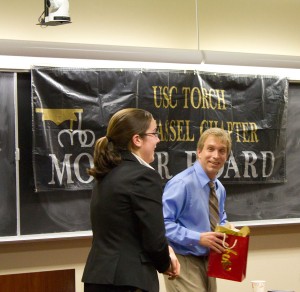Vice provost gives students ‘last lecture’
Gene Bickers, professor of physics and astronomy and vice provost for undergraduate programs, shared his thoughts about the evolution of scientific theory and its relevance to intelligent life during his “last lecture” hosted by the Torch and Tassel Chapter of USC Mortar Board on Wednesday night.

Wise words · Gene Bickers receives a gift from the USC Mortar Board after his lecture, where he spoke about the importance of college. - Chloe Stepney | Daily Trojan
The idea for the Last Lecture Series comes from the late Randy Pausch, computer science professor at Carnegie Mellon University, said Evan Snyder, vice president of Mortar Board.
After being diagnosed with pancreatic cancer, Pausch gave a speech at CMU announcing his diagnosis and sharing with the audience important life lessons and aspirations. He then wrote a book, The Last Lecture, which discussed similar sentiments.
“The format became widely known through his book,” Snyder said. “That’s where Mortar Board got the idea for the event.”
After entering the event and standing before the packed room in Seaver Science Library, Bickers joked, “This is so intimidating; I thought we would have a small group.”
Bickers began his lecture by telling the audience that friendship was what he valued most about his experiences both in college and through teaching.
“The thing that I have valued in being a faculty member is the lasting friendships I’ve been able to make with faculty, but particularly with students,” Bickers said.
Max Reynolds, a freshman majoring in mechanical engineering, said he came to the event to learn more about Bickers.
“I’m taking his class next semester,” he said. “I’ve heard all good things about him. He has a reputation as a really good teacher and I’m looking forward to getting a picture of who he is.”
James Meiners, a senior majoring in industrial and systems engineering, said he came to the lecture because of Bickers’ ability to engage students.
“He could be talking about anything and it would be something you’d want to listen to just because of how good he is at speaking and relating things,” Meiners said.
Bickers encouraged students to take advantage of the opportunities they have to make lasting relationships.
“Whether you go into industry, whether you go into business, or whether you teach, at some level, the thing you will value over time is the friends you make,” he said. “They will stay with you long after the experience is gone.”
Bickers has taught at USC at a variety of levels, having joined the faculty as an assistant professor in 1988. His research has focused on the physics of strongly correlated electrons in solids, and he has received numerous awards for excellence in teaching.
Bickers discussed the importance of certain mathematical numbers in our understanding of the universe and intelligent life. He also addressed topics such as Einstein’s theory of relativity, the Big Bang theory, the dimensions of space, intelligent design and string theory.
“If you look at physics, we have a beautiful, elaborate theory that describes most of the universe as we deserve it and it’s been incredibly successful in a number of ways,” Bickers said. “The more I’ve learned about it over the years, the more remarkable I thought it was.”
Bickers said he wished he would have studied more philosophy in college to give himself a deeper meaning for the physical sciences.
“I don’t know what the answer is. There is an intelligent force behind all of this and that is why things are how they are,” said Bickers, who mentioned that this concept is often the foundation for religion.
Bickers concluded his lecture by referencing how far scientific thinking has come since the beginning of the 20th century, yet he said there is still more to discover.
“I hope we figure out some more of the answers,” Bickers said. “The exciting thing is that all of you here, I bet you’re still alive at the end of the 21st century.”
